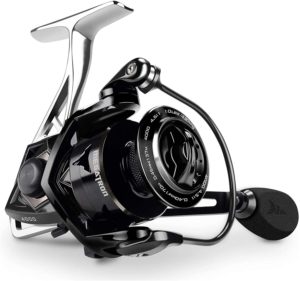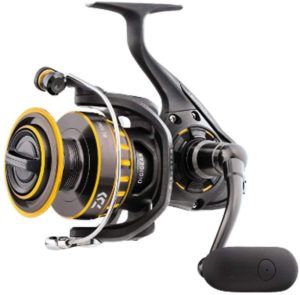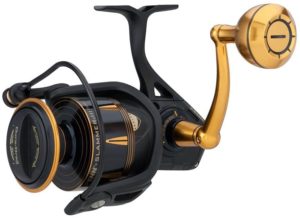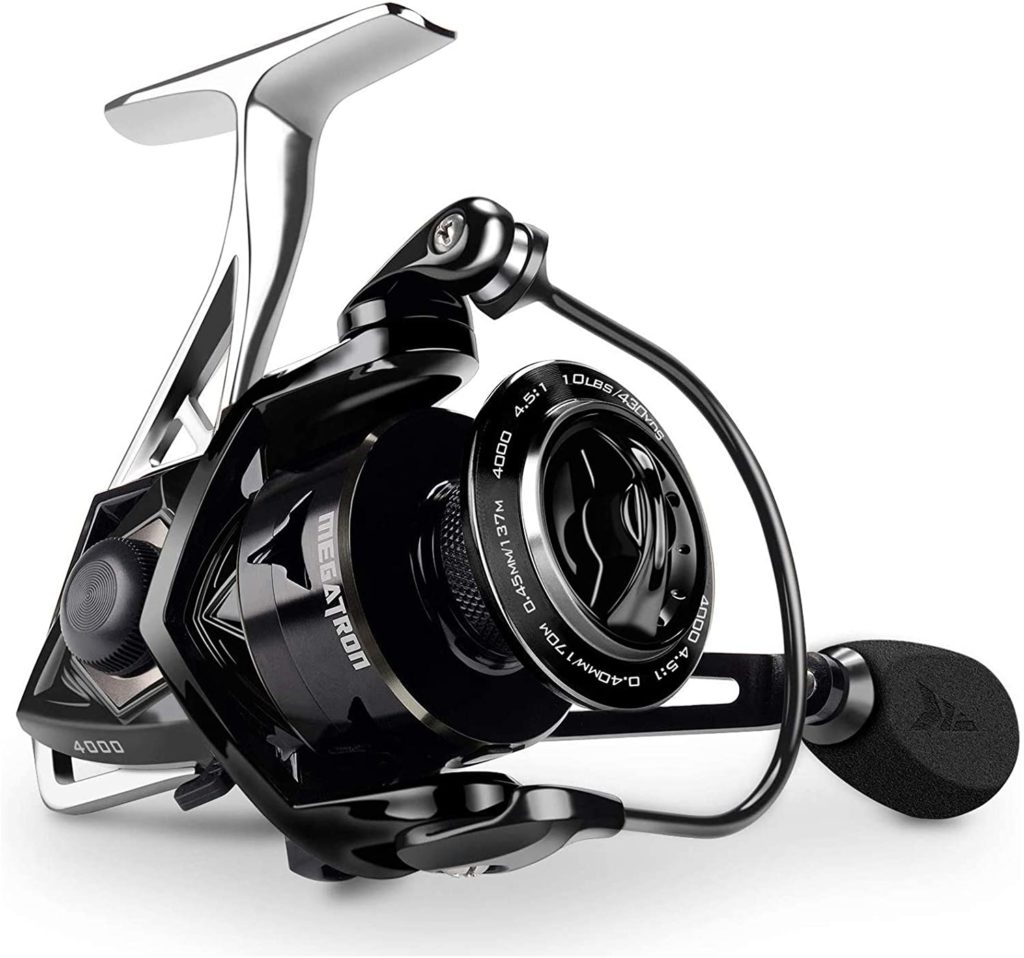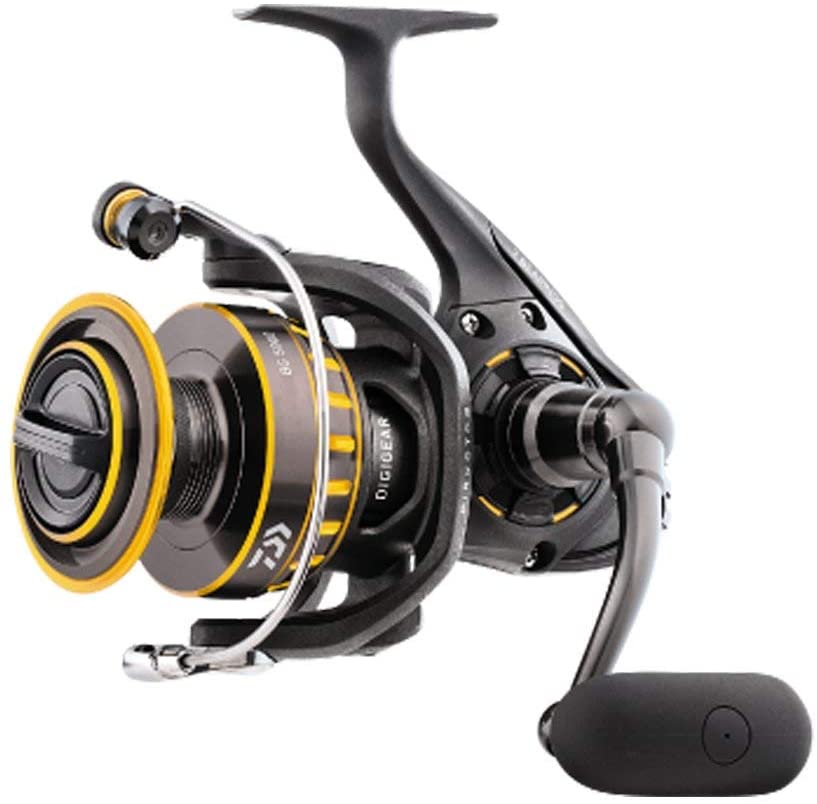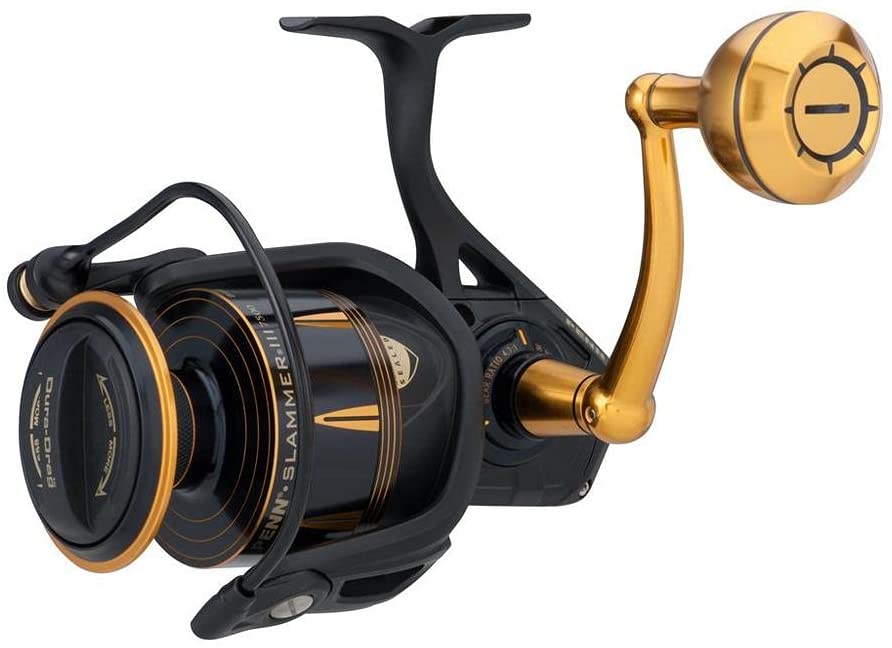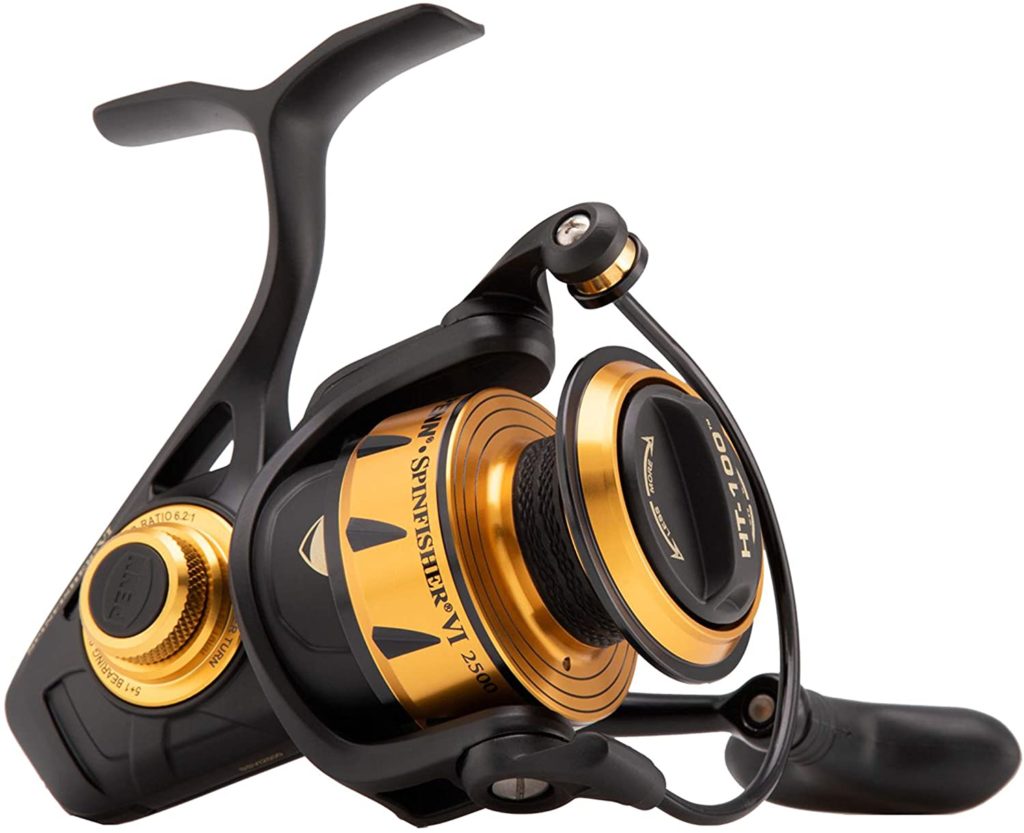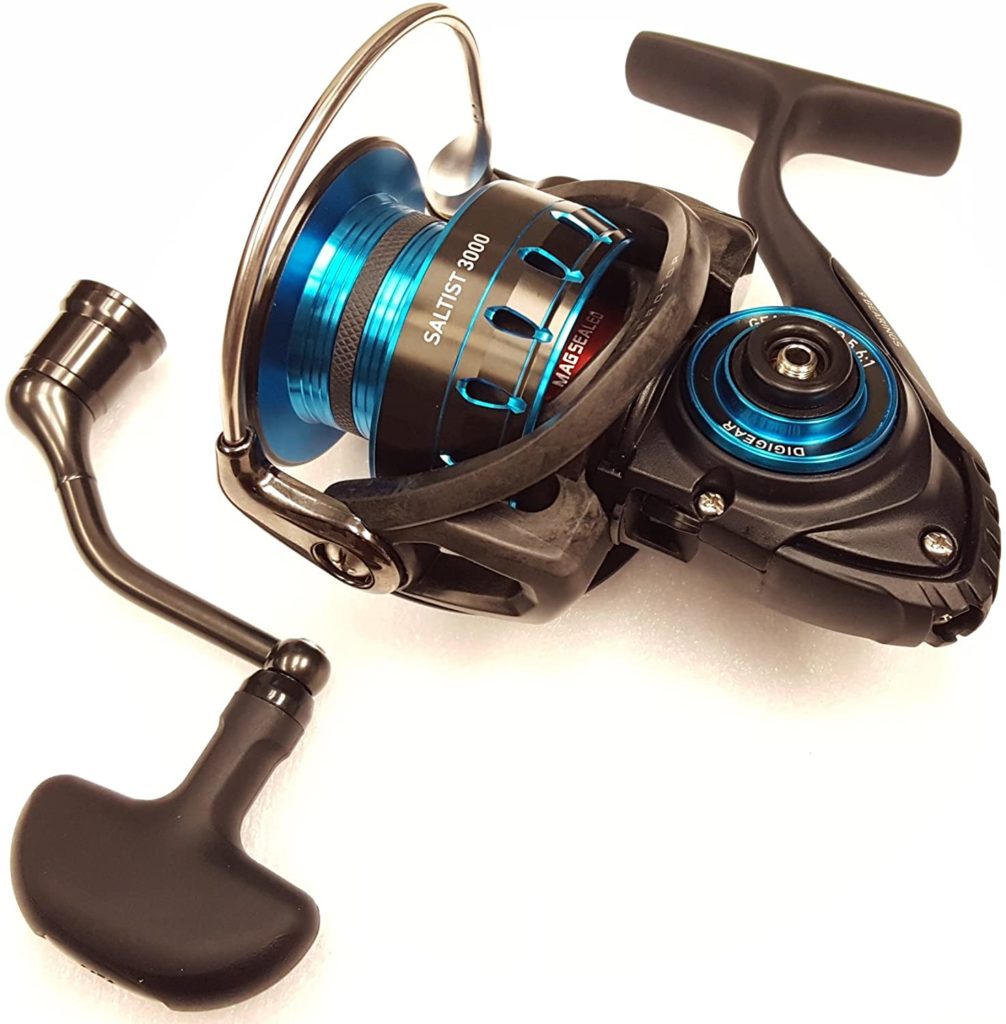The first consideration when fishing salt is not reel selection but inshore versus offshore fishing. Deepwater can be alluring and rewarding, but the ocean can be a cruel, salty mistress.
Taking an offshore trip requires planning, preparation, equipment and tackle out the wazoo, and a whole lot of patience.
You may hook into a trophy out there, but you may just as well spend your day trolling around with your sonar or radar in high winds and unpleasant seas just to end up back at the local crab shack checking the menu.
And we’re talking all of that for a generally hands-off fishing (check this article for fishing tactics & skills) experience. The hook ups can last hours, no doubt, but they are few in and far between. And less personal.
Looking to get into a ton of fish in the salt, keep the tackle light and the equipment simple, and maybe even get the family involved? You already know, or now you do, that inshore, or fishing in salt waters of less than 30 feet of depth, is the way to go.
Now, with more consistent year-round angling and more hookups than most other types of fishing, the inshore setup is simple, but proper tackle is imperative. You might also be interested in this article about drift fishing here.
Like any other fishing, the heart of the inshore tackle is the reel, and the most important thing you can do is find a good one. And if you found the one, make sure that you take care of it. Clean and lubricate your fishing reel using gun oil or other lubricants.
Best Budget
Kastking offers a uniquely designed, smooth as butter reel with a rugged build. Even at a small price, this one is meant for catching big fish. This is a solid purchase for any fisherman looking to transform their angling experience.
Check Today's PriceKastking is quickly becoming the name of the game in affordable fishing tackle that meets your premium expectations, and the Megatron holds true to that reputation.
With an all-metal aerospace aluminum alloy frame, sealed graphite body, precision geometry, and a zinc alloy main gear, this thing was built to withstand the salt.
A total of 8 double-shielded stainless steel bearings, a triple-disc carbon drag, and a reversible aluminum handle will have this thing casting far and retrieving smoothly.
Keep in mind that the highest gear ratio the Megatron comes with is 5.0:1. That may be a little slow for some angling techniques.
Best Price to Quality
The Daiwa Bg Spinning reel is a lean, mean catching machine that will give you the confidence you need to pull in fish after fish. With sound mechanical components, a build like Sherman tank, and features generally found on more expensive reels, this one will keep you smiling and fishing day after day.
Check Today's PriceThe Daiwa Bg is a reel for the angler looking for a solid build quality, sound mechanics, and features abound at a reasonable price.
This thing is ready to fish and take a beating with a solid feel to the handle, a braided line-ready aluminum ABS Spool, a black anodized machined aluminum housing, and a waterproof drag system.
This reel should also feel smooth and steady casting and retrieving thanks to its seven total bearings, infinite anti-reverse, and nearly 40 inches of line returned per handle rotation.
When purchasing the Daiwa Bg, keep in mind that its sturdy build means it won’t fit on every reel handle. If you’re inshore fishing, the 3000 should hold plenty of line, though, and pair well with all of your rods.
Best Premium
The reviews are in, and this one's legendary. With a nearly indestructible design, a smooth retrieve, super smooth drag under extreme pressure, and the versatility to catch everything from green guppies to grey sharks, if you're looking for a premium reel, that'll do it all, look no further.
Check Today's PriceThe PENN Slammer III is a reel that means business. Not only does it have looks to kill, but it also can purely back them up in every situation.
With a full metal IPX6 sealed body, side plate and rotor, and a sealed slammer dura drag system, this reel will last for seasons to come and should stay as smooth as it was the day you bought it.
PENN designed this reel with premium features that will bring the versatility an inshore fisherman is looking for. The CNC Gear technology and sealed Dura-Drag will have this reel casting and retrieving through its 6.2:1 gear ratio with complete ease. And a max drag of 30 pounds on the smallest model means this thing doesn’t balk once you get the big one on.
Best Overall
The PENN Spinfisher VI is a reel meant for the versatile saltwater angler. Its rugged feature first design means it'll handle delicate cast after cast from your inshore boat before taking a thrashing in the spray at your favorite local beach.
Check Today's PriceThe PENN Spinfisher VI was designed with pure saltwater durability in mind. The whole reel has an IPX5 rating from the body to the spool. That means that even the HT-100 carbon fiber drag washers are housed in a fully sealed compartment. As a result, this reel will take a saltwater beating, stay as smooth as you remember it was the first day you bought it, and never lose the stopping power you love.
Along with the durable design, this reel comes with a CNC Gear System, meaning you’ll have precise alignment under load after load.
When purchasing this reel, remember that it’s all-metal design and durable components mean it may weigh a bit more than other reels of a similar design and structure. You’ll also want to consider the various choices in design components. You can purchase this reel in its basic form, bail-less, in a live liner version, or a long cast version.
Also Recommended
The Daiwa Saltist is a tried and true name when it comes to saltwater durability. With a lightweight design, Daiwa's "HardbodyZ" body, and side cover and features galore, this reel will have you catching fish with reliable ease until the cows come home.
Check Today's PriceDaiwa has been making spinning reels since 1955, and the commitment shows. This reel is smooth as butter and solidly built, with a design that will dominate your saltwater fishery and take any punishment you can throw at it.
A durable build and patented magsealed main shaft, and line roller will keep this reel fishing even with direct saltwater exposure, and thanks to CRBB, even if the elements get in, the reel will keep casting smooth and long.
An air rotor design weighing up to 15% percent less than standard rotors will keep you on the water, meaning all of that casting power won’t go to waste.
Keep in mind that the gear ratio on this reel is a bit slower than many anglers like.
What makes a great inshore spinning reel?
Inshore fishing is all about that middle ground. You’re in the salt, but not too far out, and the fish are big, but not too big.
For that reason, inshore spinning reels should also fall somewhere in the middle. You’ll want a reel delicate and fine-tunable enough to present long casts to wary fish but also sturdy enough to throw on the occasional big boy.
When inshore fishing, if only targeting large or small fish, you can opt for a heavy inshore reel or a light inshore reel. This selection is species dependent. Whichever way you go, though, you’ll want to consider a reel that can do everything or most things you’ll throw at it.
So, a great inshore reel, whether light spinning reel or heavy, needs to hold a lot of line, possess a smooth enough and finely tunable drug for various types of inshore fish, offer that quick retrieve shallow water fisherman love, and obviously be corrosion resistant.
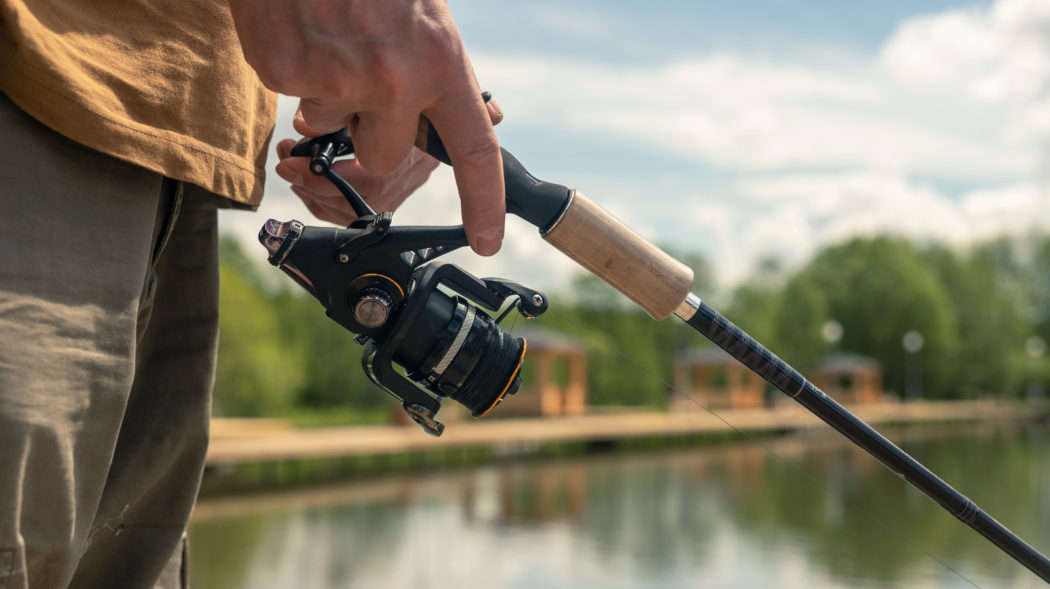
What benefits do spinning reels have over baitcasting reels for Inshore fishing?
You read that right. We’re not talking about the age-old debate over spinning reels versus baitcasting reels for bass fishing. Instead, let’s consider spinning reels versus baitcasters for inshore fishing.
For many people, baitcasters are the perfect reel for just about everything. Anglers love the accuracy and, dare I say, machismo that comes with their use. The deal is, though, that inshore fishing salt, especially the flats, is really the perfect place for a spinner.
Perhaps the most significant advantage a spinning reel has for inshore fishing is the lack of backlash. When it comes to fishing in a windy location, a spinning reel can punch through the thick of it without one. However, that feat will be near impossible on a casting reel.
Another thing to consider is the size of your presentation. If you’re fishing any lure under a quarter ounce for a smaller or picky fish when inshore fishing, a casting setup is simply ineffective. The weight of the lure won’t be enough to carry the cast where you need it.
And when you’re ready to change the weight of that lure, or maybe you’re fishing with live bait. Well, every time you change that bait or lure size with a casting reel, you’ll need to change your baitcasting controls.
In the end, a spinning reel and baitcasting reel are meant to complement each other and not compete. If you’re fishing open inshore water, though, there’s no competition anyways. Spinning reel for the win.
How to choose the best spinning reel inshore fishing?
Whether looking to pick up a new spinning reel for your inshore fishing adventures, or your first one, there are a few things to consider.
Material
The nature of inshore fishing means you’ll need something durable and rugged. All reel bodies are generally made of aluminum, graphite, plastic, or a combination of all three. The component you’ll most consider when selecting an inshore reel based on material is corrosion resistance.
Graphite is a naturally corrosion-resistant material, so most inshore reels are usually graphite. However, more expensive reels also come in corrosion-resistant anodized aluminum.
Consider a reel with a forged aluminum spool if you’re looking for even more durability and corrosion resistance.
Size
Most reel manufacturers offer reel sizes in the categories of small (500-2000), medium(3000), and large(4000+).
When considering an inshore reel, you’ll want something in the medium range or about 3000. Inshore fishing can mean casting all day, and a heavier reel may lead to fatigue. Even worse, a heavy reel paired with the proper medium-light action inshore rod will mean an unbalanced setup. An unbalanced setup that will result in shorter, less precise casts and more fatigue.
Gear Ratio
Your reel’s gear ratio determines how quickly your spinning reel will pick line up off the salt when retrieving. Whether you’re pulling your line in for another cast, setting your hook, or dragging that rig across the sand to entice a strike from that monster redfish, gear ratio is huge.
Most saltwater spinning reels fall into the classification of high speed or low-speed gearing. For inshore fishing, you’ll want something on the higher end, around 6.0:1.
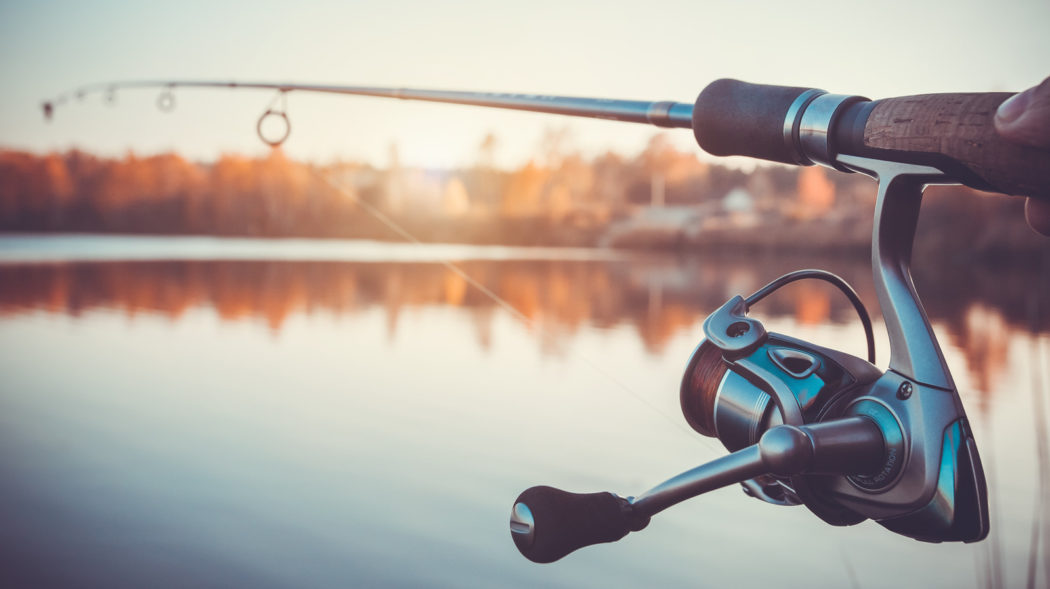
Line Capacity
When choosing your spinning reel spool size, you’ll always want to consider line capacity based on the weight and amount you’ll need for the fish you’re after.
A good rule of thumb for most inshore fishing is to have a spool that will hold about 200 yards of 15-pound test line.
Drag Rating
The majority of the fish caught inshore angling will be on the small to medium size.
In most cases, the general rule for drag rating is to keep it at about 25 percent of the line weight you are using. Since inshore fish are in the small to medium range, even your heavy line should be under 20 pounds of test.
This means that at most, when inshore fishing, you’ll be looking for a reel with around a six pounds of drag rating.
Bearings
Most spinning reels will come with between 2 to 10 bearings. More and higher quality bearings generally mean a smoother, more predictable reel.
Inshore fishing involves far cast after far cast in saltwater. Because of this you’ll want to find a reel with a high number of sealed corrosion-resistant bearings.
Price
In a lot of freshwater applications, you’ll be able to get away with a lower-priced or quality reel and still have a ton of fun fishing.
Unfortunately, that’s not always the case when fishing in the salt. Salt is corrosive by nature, and even a corrosion-resistant reel that’s not properly rinsed after each use can show wear over time.
When looking for the best reel for inshore fishing, you’ll want to spend a little more upfront and get the proper reel for the job.
Conclusion
When looking for a quality inshore reel, you want to keep in mind the fishery. You’ll be out on the salt, fishing in water that is less than 30ft deep and often clear for boat wary fish. And a good number of days, you’ll be combating the elements.
The best reel for inshore fishing, then, should be corrosion-resistant, durable, smooth enough to cast far in poor conditions and clear water, and light enough to throw all day.
As an Amazon Associate, Fishermen's Angle earns from qualifying purchases. We get commissions for purchases made through links in this post.

